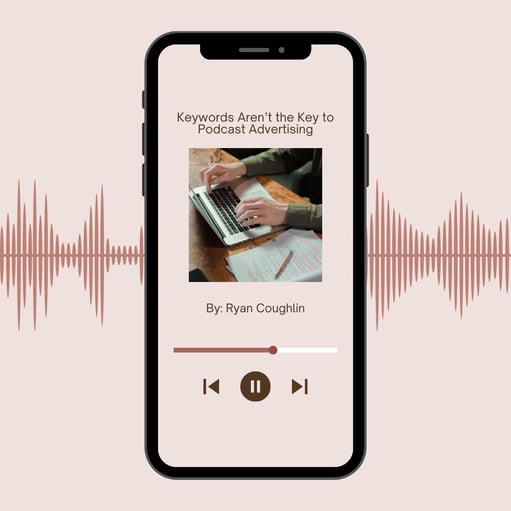Keywords Aren’t the Key to Podcast Advertising

A true contextual adtech solution is the key, and it launched this year.
Podcast industry players are locked out of a room full of gold.
Imagine standing in front of a bolted door to a room full of gold. All you need is the key, and you’ll be able to unlock the treasure.
Actually, no need to imagine. This is the state of podcast advertising today.
There are billions of dollars in untapped ad revenue potential for audio.
In 2022, podcasting is one of the fastest-growing digital media channels, and its advertising revenue is growing 2x faster than the rate of the internet advertising market as a whole. Both supply and demand are growing exponentially in podcasting.
With all of this growth, the Interactive Advertising Bureau (IAB) predicts podcast ad revenue will top $2 billion this year and surpass $4 billion by 2024.
However, these forecasts should be much larger.
What’s missing is the right technology to effectively target audiences across podcasts at scale. To do that, we need adtech that provides automated brand safety, suitability, and contextual targeting tools specialized in podcasting.
The current solutions in market are built upon keyword identification and targeting. Because keywords lack context and human speech is complex, solutions driven by keyword data are error-prone and ineffective.
In the following, I’ll break down:
- Why aren’t keywords (and keyword targeting solutions) the key to podcast advertising?
- What does the right audio adtech solution look like?
- Why I think Sounder’s brand safety and contextual advertising solution is the key.
The industry needs a solution that can truly understand and navigate the human conversations in podcast audio to find the best content for brands to invest in. If you want to skip ahead, reach out and we’ll show you how our solutions can serve your podcast advertising needs.
Let’s get started.
Why aren’t keywords the key to podcast advertising?
Like I said above, the big issue with keywords—and adtech driven by keyword targeting and anti-targeting—is that keywords don’t contain enough insight to provide context.
Without context—how could such solutions for brand safety, suitability, and contextual advertising be effective?
This contextual challenge is especially difficult in podcast advertising because:
- Speech is complex and always evolving with new words and uses
- The meaning of a word can vary greatly with the use of metaphors, idioms, slang, etc.
For example, let’s consider the challenge of keyword targeting in brand safety and suitability models. Here are a few the most blocked keywords in recent years.

The word “shooting” can be used to reference “shooting a basketball,” a “shooting star,” a “gun shooting,” or anything else. Two of the three use cases in this example are brand-safe. Now, think about what happens when scaling this filter across the 455,000+ active podcasts on Apple.
That’s a ton of content incorrectly removed from advertising inventory.
It’s important to note in adjacent industries like search and display, keyword targeting is a common and effective solution when paired with other criteria.
The problems arise when businesses try to apply the same models from adjacent industries to solve for podcast advertising. Using models not built for podcasting is like trying to fit a square peg in a round hole. It doesn’t work.
This leads to the next point of discussion: What does an effective audio adtech solution look like?
Or, going back to our locked room analogy…
What does the key to podcast advertising look like?
To unlock the true value of podcast content, we need advertising technology that is:
- Built specifically for podcasts and understands human speech
- Capable of transforming audio into contextual insights for advertising
- Capable of finding optimal spots for a brand’s message in relevant content—such as breaks, chapters, or engaging segments
The solution also has to be fast. It has to be capable of processing millions of hours of existing and new podcast content with accuracy.
This is simple to describe but hard to build. And that’s…
Why I think Sounder’s solutions are the key that podcasting needs.
Our brand safety and suitability solution for audio is the first of its kind.
What excites me most about Sounder’s Audio Data Cloud (ADC) technology is that it’s truly intelligent in its ability to understand human speech.
Our brand safety and contextual targeting solutions address both the specific challenges of creating adtech for spoken word audio and the weaknesses seen in older models like keyword targeting.
In other words, our solutions are:
- Built specifically for podcast advertising. All of Sounder’s models are trained on podcasts, ensuring that context and real meaning are taken into account when surfacing relevant insights.
- True contextual targeting technology. Our models target context, not keywords. Sounder’s Audio Data Cloud interprets the meaning of content from multiple layers of spoken word insights—topic, tone, intention, sentiment, and more.
- Lightning fast and precise. Our technology can surface safety and suitability ratings, full transcripts, topics, sentiments, chapters and more from one hour of audio in under two minutes.
It’s also the only automated solution on the market that leverages both IAB and GARM industry standards to support transparent and confident media buying in podcasts at scale.
But wait—
Doesn’t ADC use transcripts, and thereby—keywords?
Yes and no.
Keywords that are representative of the main points in a podcast are one of many data points that ADC processes and provides to our agency and publishing partners.
Our contextual models go way beyond keywords and perform a much larger analysis of topics, entities, tone, sentiment, and beyond—that are then entered into the solution’s brand safe, suitable, and contextual advertising recommendations.
Time to get to that gold!
If you’re interested in learning more about ADC, Sounder’s advertising solutions, or how ADC’s data processing and tools can be customized for your business— reach us at solutions@tritondigital.com.
Back to blog